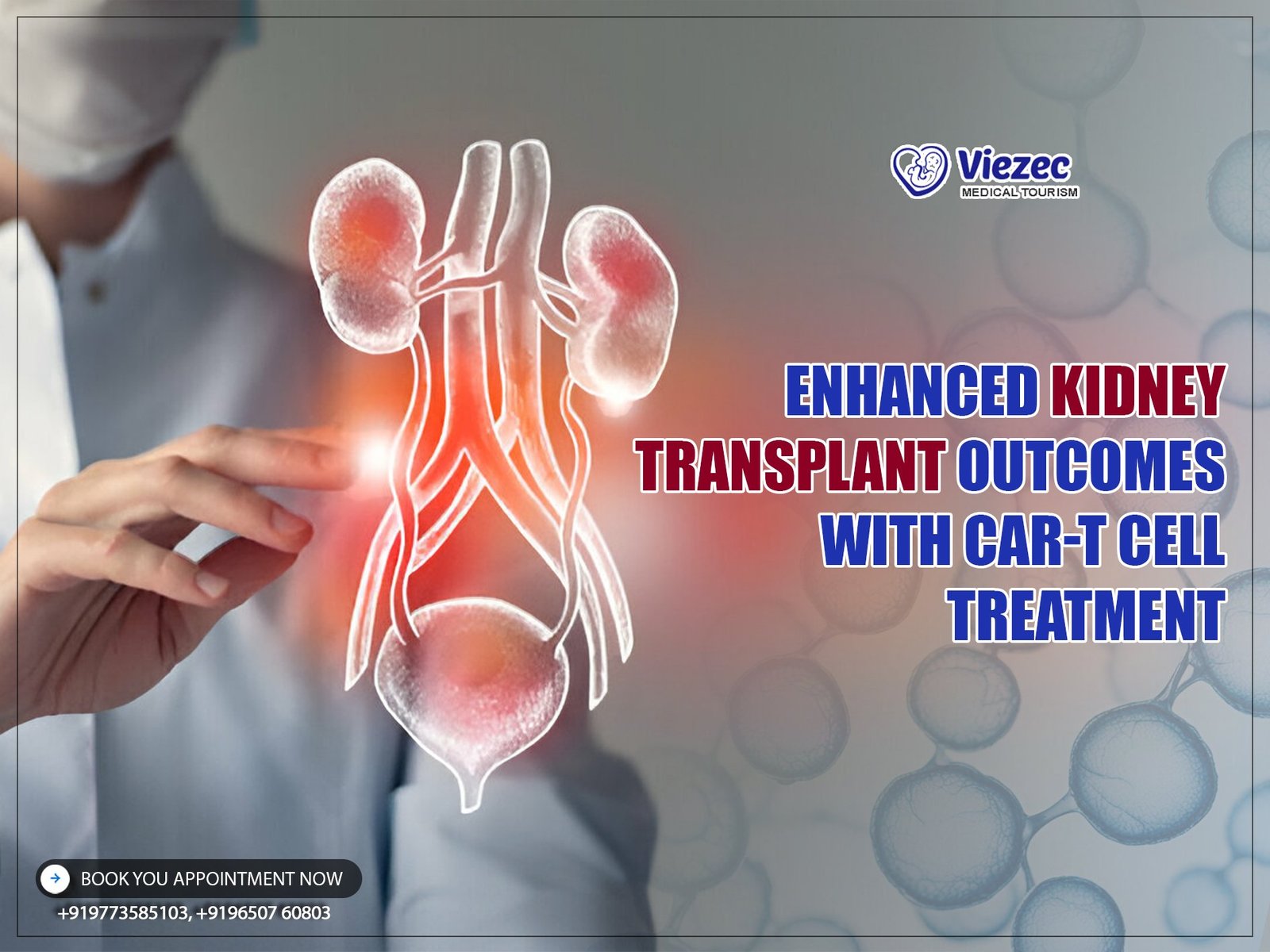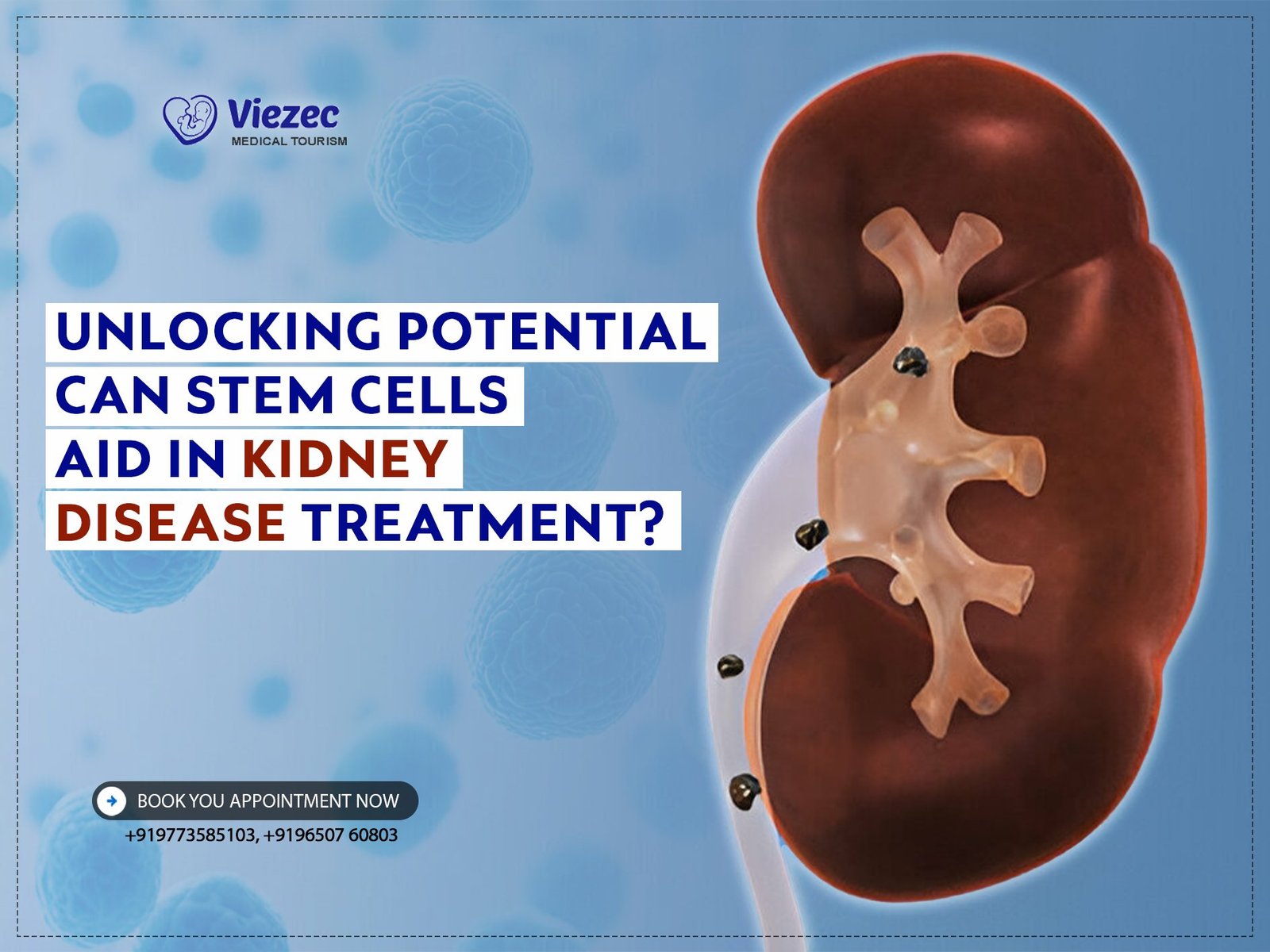Kidney transplantation stands as a beacon of hope for patients grappling with end-stage renal disease (ESRD), offering a chance at renewed vitality and improved quality of life. Despite advancements in surgical techniques and immunosuppressive therapies, challenges such as rejection and long-term graft survival persist. Concurrently, the field of cellular immunotherapy has witnessed remarkable progress, particularly with Chimeric Antigen Receptor T cell (CAR-T cell) therapy, showcasing unprecedented efficacy in hematologic malignancies. This article explores the intersection of kidney transplantation and CAR-T cell therapy, delving into the potential synergies and implications for enhanced patient outcomes.
Overview of Kidney Transplantation
Kidney transplantation stands as the gold standard treatment for ESRD, offering superior survival rates and quality of life compared to dialysis. The procedure involves the surgical placement of a healthy kidney from a living or deceased donor into the recipient’s body, providing restored renal function and liberation from the constraints of dialysis. However, the immune system’s relentless vigilance against foreign tissue poses a significant hurdle, leading to allograft rejection and necessitating lifelong immunosuppression.
Introduction to CAR-T Cell Therapy
CAR-T cell therapy represents a paradigm shift in cancer treatment, harnessing the patient’s immune system to target and eradicate malignant cells. This revolutionary approach involves genetically engineering T cells to express chimeric antigen receptors (CARs) capable of recognizing specific antigens on cancer cells, thereby enhancing T cell-mediated cytotoxicity. Initially developed for hematologic malignancies, CAR-T cell therapy has demonstrated unprecedented success, heralding a new era of personalized medicine.
Need for Enhanced Outcomes in Kidney Transplantation
Despite significant advancements in surgical techniques and immunosuppressive therapies, kidney transplantation faces persistent challenges, including acute and chronic rejection, infection, and long-term graft dysfunction. The quest for enhanced outcomes drives ongoing research into novel therapeutic modalities, including cellular immunotherapy, to improve graft survival, minimize rejection, and mitigate the adverse effects of immunosuppression. CAR-T cell therapy emerges as a promising avenue in this endeavor, leveraging its potent immunomodulatory properties to bolster graft acceptance and durability.
Understanding Immune Response in Kidney Transplantation
Comprehending the intricacies of the immune response post-kidney transplantation is paramount to devising effective therapeutic strategies to mitigate rejection and promote graft tolerance.
Immune System Dynamics Post-Transplant
Following kidney transplantation, the recipient’s immune system undergoes dynamic shifts, transitioning from a state of heightened vigilance during the immediate post-transplant period to a delicate balance of tolerance and surveillance. The interplay between innate and adaptive immunity orchestrates a complex cascade of cellular and humoral responses, culminating in either graft acceptance or rejection.
Alloimmunity and Rejection Mechanisms
Alloimmunity, characterized by the recognition of donor antigens as foreign, serves as the primary driver of graft rejection. Alloreactive T cells recognize mismatched human leukocyte antigens (HLAs) presented by donor antigen-presenting cells, initiating a cascade of pro-inflammatory cytokine release and effector T cell activation. Concurrently, donor-specific antibodies (DSAs) targeting HLA molecules can elicit antibody-mediated rejection (ABMR), further compromising graft viability.
Role of T Cells in Transplant Rejection
T lymphocytes, comprising both CD4+ helper and CD8+ cytotoxic subsets, play a central role in allograft rejection through direct cellular cytotoxicity and cytokine-mediated effector functions. Alloreactive T cells infiltrate the allograft, eliciting tissue damage and inflammation, while regulatory T cells (Tregs) exert immunoregulatory effects, promoting tolerance and dampening alloimmune responses. The delicate balance between effector and regulatory T cell subsets dictates the fate of the transplanted organ, underscoring the therapeutic potential of modulating T cell activity.
Mechanisms of CAR-T Cell Therapy
The application of CAR-T cell therapy in kidney transplantation represents a novel approach to modulating the alloimmune response and promoting graft acceptance.
Basics of CAR-T Cell Engineering
CAR-T cell engineering involves the genetic modification of autologous T cells to express synthetic receptors targeting specific antigens present on alloreactive T cells or other immune effectors. The CAR construct typically comprises an extracellular antigen recognition domain, a transmembrane domain, and intracellular signaling motifs derived from co-stimulatory molecules and T cell activation domains. Upon antigen encounter, CAR-T cells undergo activation, proliferation, and targeted cytotoxicity, culminating in the elimination of alloreactive T cells and dampening of the immune response.
Targeting Alloimmune Responses with CAR-T Cells
CAR-T cell therapy offers a targeted approach to mitigating alloimmune responses by selectively eliminating alloreactive T cells while preserving regulatory T cell populations. Engineered CAR-T cells can be designed to recognize and eradicate donor-specific alloreactive T cells bearing mismatched HLA antigens, thereby attenuating the risk of acute and chronic rejection. Additionally, CAR-T cells can be engineered to express inhibitory receptors or cytokines to promote immune tolerance and dampen pro-inflammatory responses within the allograft microenvironment.
Enhancing Graft Tolerance through CAR-T Cell Modulation
Beyond direct alloreactive T cell targeting, CAR-T cell therapy holds promise for inducing durable graft tolerance by promoting regulatory T cell expansion and function. By modulating the balance between effector and regulatory T cell subsets, CAR-T cells can foster an immunoregulatory milieu conducive to long-term graft acceptance. Furthermore, the potential for CAR-T cell persistence and local cytokine production within the allograft offers sustained immunomodulatory effects, bolstering graft survival and minimizing the need for chronic immunosuppression.
Preclinical Studies on CAR-T Cell Therapy in Kidney Transplantation
Animal Models and Preclinical Findings
In preclinical models of kidney transplantation, CAR-T cell therapy has demonstrated remarkable efficacy in mitigating graft rejection. Animal studies have elucidated the potential of CAR-T cells to selectively target alloantigens expressed on the surface of graft-resident immune cells, thereby preventing immune-mediated damage to the transplanted kidney.
Efficacy and Safety Profiles of CAR-T Cells in Preclinical Settings
Preclinical investigations have underscored the robust anti-rejection properties of CAR-T cells while also delineating safety considerations. Studies have shown that CAR-T cells can effectively eliminate alloreactive T cells without compromising systemic immunity, paving the way for clinical translation.
Insights into Long-Term Graft Survival
Furthermore, preclinical studies have provided insights into the mechanisms underlying long-term graft survival facilitated by CAR-T cell therapy. By inducing peripheral tolerance and modulating the alloimmune response, CAR-T cells offer a promising strategy for achieving durable graft acceptance in kidney transplantation.
Clinical Trials and Case Studies
Overview of Clinical Trials Utilizing CAR-T Cells in Kidney Transplantation
The transition from preclinical research to clinical trials has yielded encouraging results, with several trials investigating the safety and efficacy of CAR-T cell therapy in kidney transplant recipients. These trials have demonstrated the feasibility of CAR-T cell infusion and its potential to improve graft outcomes.
Case Studies Demonstrating Improved Outcomes with CAR-T Cell Therapy
Moreover, case studies have provided compelling evidence of the clinical benefits conferred by CAR-T cell therapy in kidney transplantation. Patients receiving CAR-T cell treatment have exhibited reduced rates of acute rejection and improved graft function, highlighting the therapeutic potential of this innovative approach.
Challenges and Lessons Learned from Clinical Implementations
Nevertheless, the clinical implementation of CAR-T cell therapy in kidney transplantation poses unique challenges, including the risk of off-target effects and the need for personalized treatment regimens. Through ongoing trials and real-world experience, valuable lessons are being learned to optimize the use of CAR-T cells in clinical practice.
Immunomodulatory Effects of CAR-T Cells in Kidney Transplantation
Impact of CAR-T Cells on Regulatory T Cells
One of the key immunomodulatory mechanisms of CAR-T cells involves their interaction with regulatory T cells (Tregs). CAR-T cell therapy has been shown to enhance Treg function, promoting immune tolerance and preventing allograft rejection.
Modulating Cytokine Milieu and Inflammatory Responses
CAR-T cells exert their immunomodulatory effects by modulating the cytokine milieu and suppressing inflammatory responses within the transplant microenvironment. This dynamic interplay between CAR-T cells and the immune system contributes to the maintenance of graft tolerance.
Inducing Peripheral Tolerance in Transplant Recipients
By inducing peripheral tolerance, CAR-T cells offer a novel approach to promoting immune tolerance in transplant recipients. Through targeted manipulation of immune checkpoints and signaling pathways, CAR-T cell therapy holds promise for achieving durable graft acceptance without the need for chronic immunosuppression.
Strategies for CAR-T Cell Optimization in Kidney Transplantation
Engineering CAR-T Cells for Improved Specificity
To enhance the specificity and efficacy of CAR-T cell therapy in kidney transplantation, ongoing efforts focus on engineering CAR constructs with optimized targeting domains and signaling motifs. These advancements aim to minimize off-target effects while maximizing alloantigen recognition.
Enhancing CAR-T Cell Persistence and Expansion
Another area of research involves enhancing the persistence and expansion of CAR-T cells within the transplant microenvironment. Strategies such as cytokine supplementation and genetic modification hold potential for prolonging CAR-T cell activity and improving long-term graft outcomes.
Targeting Alloantigens with Precision
Precise targeting of alloantigens is critical for the success of CAR-T cell therapy in kidney transplantation. By identifying and prioritizing immunogenic targets, researchers aim to develop CAR-T cell constructs with enhanced specificity and reduced risk of immune-mediated toxicity.
Safety Considerations and Adverse Events
Managing Cytokine Release Syndrome and Neurotoxicity
The clinical application of CAR-T cell therapy necessitates vigilant monitoring and management of potential adverse events, including cytokine release syndrome (CRS) and neurotoxicity. Early recognition and prompt intervention are essential for mitigating these complications and ensuring patient safety.
Long-Term Safety Monitoring in Transplant Recipients
Long-term safety monitoring is imperative for assessing the durability of CAR-T cell therapy and identifying potential late-onset adverse events. Comprehensive follow-up protocols and surveillance strategies are essential components of post-transplant care in patients receiving CAR-T cell treatment.
Strategies for Minimizing Off-Target Effects
Efforts to minimize off-target effects and improve the safety profile of CAR-T cell therapy involve the refinement of target antigen selection and the incorporation of safety switches into CAR constructs. These strategies aim to enhance the therapeutic index of CAR-T cell therapy while minimizing the risk of unintended toxicity.
Combination Therapies with CAR-T Cells
Immunosuppressive Regimens in Conjunction with CAR-T Cell Therapy
Combination therapies integrating CAR-T cell therapy with conventional immunosuppressive regimens offer a synergistic approach to preventing graft rejection and promoting long-term tolerance. By harnessing the complementary mechanisms of action, these combination strategies hold promise for improving transplant outcomes.
Combinatorial Approaches for Enhanced Graft Acceptance
Moreover, combinatorial approaches incorporating CAR-T cell therapy with other biologic agents, such as monoclonal antibodies and cytokine inhibitors, represent a promising avenue for enhancing graft acceptance and minimizing the need for chronic immunosuppression.
Synergistic Effects of CAR-T Cells with Other Biologics
The synergistic effects of CAR-T cells with other biologics extend beyond immunosuppression to encompass immune modulation and tissue repair mechanisms. Through strategic combination strategies, researchers aim to harness the full potential of CAR-T cell therapy in kidney transplantation.
Patient Selection Criteria and Treatment Guidelines
Identifying Suitable Candidates for CAR-T Cell Therapy
The identification of suitable candidates for CAR-T cell therapy in kidney transplantation relies on a comprehensive assessment of transplant history, immunological risk factors, and comorbidities. Patient selection criteria aim to optimize treatment outcomes while minimizing the risk of adverse events.
Treatment Algorithms and Protocols in Kidney Transplantation
Treatment algorithms and protocols for CAR-T cell therapy in kidney transplantation encompass various stages, including patient evaluation, CAR-T cell manufacturing, infusion protocols, and post-transplant monitoring. Standardized guidelines facilitate consistency and reproducibility across clinical settings.
Ethical Considerations and Informed Consent
Ethical considerations surrounding the use of CAR-T cell therapy in kidney transplantation encompass issues of patient autonomy, informed consent, and equitable access to innovative treatments. Transparent communication and shared decision-making are essential components of ethical practice in transplant medicine.
FAQs
1. What are the potential risks of CAR-T cell therapy in kidney transplantation?
CAR-T cell therapy carries inherent risks, including cytokine release syndrome, neurotoxicity, and off-target effects. Close monitoring and prompt management of adverse events are essential for ensuring patient safety and optimizing therapeutic outcomes.
2. How does CAR-T cell therapy compare to traditional immunosuppressive regimens?
Unlike conventional immunosuppressive agents, which broadly suppress the immune system, CAR-T cell therapy offers targeted immune modulation tailored to the individual’s immunological profile. By harnessing the specificity and potency of genetically engineered T cells, CAR-T therapy holds the potential to achieve durable graft acceptance with minimal long-term immunosuppression.
3. What is the future outlook for CAR-T cell therapy in kidney transplantation?
The future of CAR-T cell therapy in kidney transplantation is ripe with possibilities, including the development of next-generation CAR constructs targeting novel alloantigens, refinement of manufacturing techniques for enhanced cell persistence, and exploration of combinatorial approaches with emerging biologics. Continued research and clinical trials aim to unlock the full potential of CAR-T cell therapy as a game-changing intervention in the field of transplantation.
For more information on CAR-T cell therapy in kidney transplantation, visit us online or consult with a transplant specialist to explore personalized treatment options tailored to your unique needs and circumstances.











